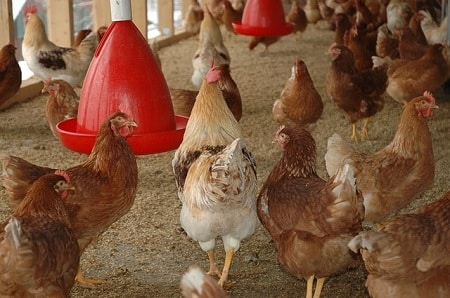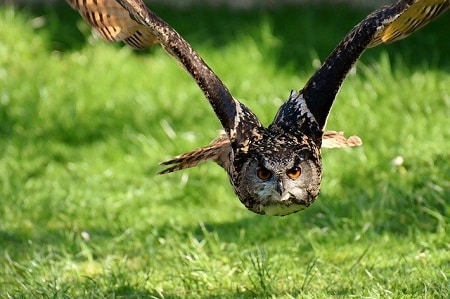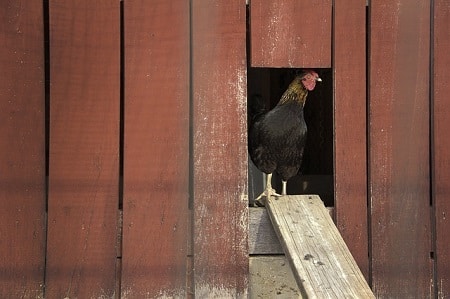The animals that most commonly bite the heads off of chickens are raccoons and owls. Although other potential predators include feral cats, hawks, dogs, foxes, and coyotes.
It’s upsetting finding one of your beloved chickens has been attacked and had their head bitten off. But, we have to remember that it’s nature, and all we can do is prevent it going forward.
Wild chickens are good at surviving in the wild, and they did so just fine for thousands of years. Backyard chickens, on the other hand, need a lot more help. Especially because they are confined to a small area.
Also, the qualities that make them attractive to us such as being plump, good layers, and slow is what makes them attractive to predators.
The good news is that you can make their coop nice and secure without too much difficulty. You just need to know what predators you’re dealing with, and what step to take - that’s what I’m here to help with!
Table of Contents
Chicken Predators: Signs to Look For

Sometimes there are warning signs that predators are gaining access to your chickens before one is killed.
If you can spot any of these signs, you might be able to prevent something more serious happening:
Eggs Going Missing - Missing or broken eggs is a sign that some kind of predator that’s too small to harm a chicken is helping themselves to their eggs.
Most likely culprits are rats, snakes, or larger animals like opossums and skunks or birds. It may be that your chickens are eating them though, so look into it before jumping to conclusions.
Related content - why do chickens eat their own eggs?
Damage to Coop - Some animals will either break through chicken wire or simply reach through and get a good hold of a chicken and kill it.
If you spot any holes or damage in the wire, repair it immediately. Same for the parameter of the coop, animals will dig and burrow under the wire if they can’t get through.
Wounded Chickens - If your chickens have been getting injured or developing wounds, don’t just pass it off as fighting with each other. It might be due to a predator, and it’s only going to get worse.
Signs that you have a serious predator problem in need of urgent action include:
Chickens Going Missing - This is just as devastating as finding a chicken has had its head eaten or is dead from other injuries. If a chicken has gone missing, it can be a mystery as to what animal has taken them.
One of the clues often left behind is feathers. Foxes will often eat most of their prey at the scene and leave a lot of evidence. While large birds might leave some of their own feathers from the scramble.
Dead Chickens with Heads - Some predators will kill and eat a chicken without taking their heads off. This will typically be a dog, cat, coyote, or fox, as they are either killing for bloodlust or to eat the chicken.
Dead Chickens with Heads Missing - This is the topic of this article. If you’re trying to find out why your chickens are headless, it’s because certain predators deliberately bite their heads off.
Raccoons, hawks, and owls are the main known culprits.
Why Do Owls Eat Chicken Heads?

To us, it seems barbaric and senseless that an owl would deliberately bite the head off of a chicken.
To owls and hawks, however, they need to find a food source and the head of a chicken presents the easiest, more nutritious meal.
There are a few reasons for this; one is that while swooping down from above, the head is the easiest target.
The second is that they are after the brains, the brain is high in protein and essential fats.
Another reason is that they can then take it away and eat it in their nest while a whole chicken is too heavy.
Why Do Raccoons Only Eat Chicken Heads?
Raccoons instinctively kill chickens by attacking their heads. Sometimes, pulling their heads is the only way to get at them through the wire of their coop too.
We know that when raccoons have had access to chickens, they will also focus on eating the chickens’ crops and chest.
Adult raccoons can weigh up to 20 lbs and are quite large compared to a chicken. They pose a serious threat with sharp claws and teeth, so do all you can to keep them locked out.
Do Foxes Eat Chickens Heads?
Foxes will also eat chicken heads, yes.
They are very dangerous when they’re in a killing mode, and will do a lot of damage to a coop of chickens if they can find a way in.
They may look more like dogs than cats, but they move more like cats than they do dogs. Foxes are very agile if you know you have them in your area double down on your coop security.
Will a Rat Kill a Chicken?
It’s very unlikely, or should I say rare that a rat will kill a chicken. Rats are more well-known for stealing chicken feed, eating their eggs, and sometimes attacking baby chicks.
It’s not completely unheard of, however. So, you should still do everything you can to stop rats from entering your coop.
Related content - Do rats attack chickens?
Do Opossums Kill Chickens?

Opossums are not that common, so if you have these marsupials in your area you’ll probably know about it.
If you do, you need to be aware that they can and do sometimes kill chickens. Especially small chickens like chicks and bantams.
They don’t typically bite their heads off as some other predators do, but it could happen. Look more so for footprints and droppings in the area, and signs that they are eating the chickens where they kill them before leaving.
Some Tips to Help You Protect Your Chickens From Predators
There is a long list of things you can do to create a Fort Knox for your chickens. But, unless you know of any specific threats right now, I recommend you do at least these following things:
Create An Enclosed Space
The basic goal is to create a large enclosed space for your chickens to roam around and enjoy themselves that’s safe from predators.
This means chicken wire all around, or something stronger with smaller holes if needed. And don’t forget to bury the wire deep, as deep as you can make it ideally.
Lots of predators will try to dig their way under the wire. They’ll give up pretty quickly once they find out the wire goes deep into the ground though.
Lock Their Coop Overnight

This might sound crazy, but some animals will get through a simple sliding lock or piece of wood that fits across two handles.
Use an actual lock that requires someone to turn or twist something. It’s a simple thing, but something that requires dexterity will stop all animals in their tracks.
Oh, and don’t forget to make sure all your chooks are securely in their coop for the night.
Consider Motion Sensor Lighting
There are a number of security measures you can take, such as electric fencing, motion sensors that sound an alarm, getting a guard dog etc.
One of the most effective, simple, and inexpensive things is motion-activated lighting. This is enough to startle most predators as they use the cover of darkness to hunt. It might also alert you and cause a clucking storm to break out from your hens.
All things that should cause enough panic for small animals and birds to flee.
In Summary - What Animal Bites Heads off Chickens?
Finding your chickens have fallen prey to a predator, and worse finding a chicken with its head bit off is devastating.
If it happens once, it may have been out of your control. Making sure it doesn’t happen again should become your focus.
Hopefully, this article has helped explain which predators are a problem, why and how they prey on chickens, and what you can do to ensure your chicks are nice and safe in the future.




